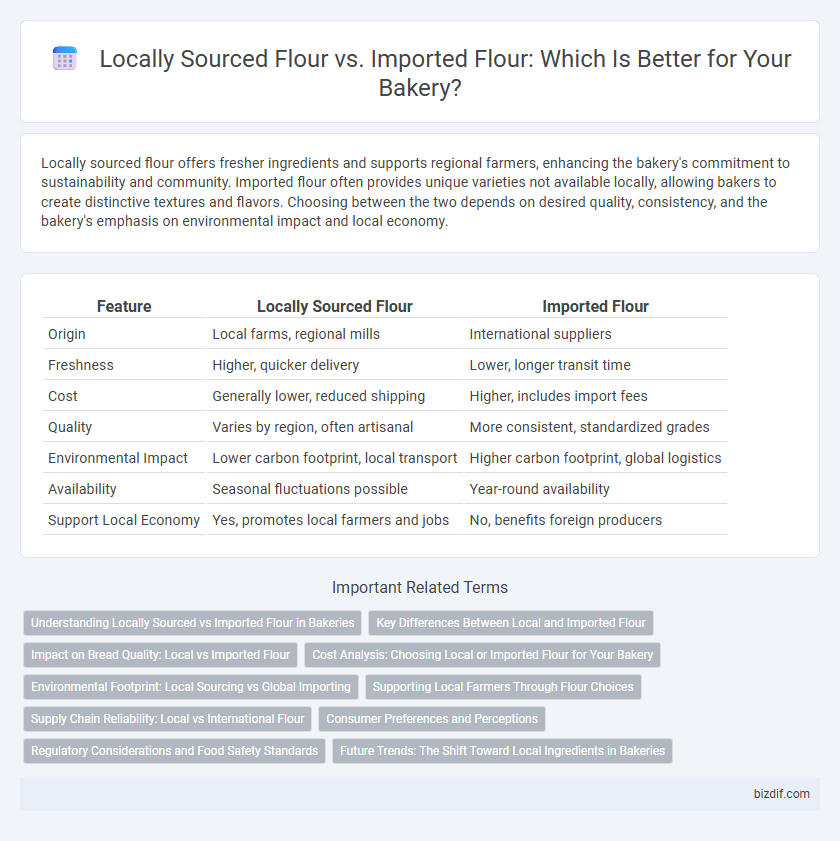Locally sourced flour offers fresher ingredients and supports regional farmers, enhancing the bakery's commitment to sustainability and community. Imported flour often provides unique varieties not available locally, allowing bakers to create distinctive textures and flavors. Choosing between the two depends on desired quality, consistency, and the bakery's emphasis on environmental impact and local economy.
Table of Comparison
| Feature | Locally Sourced Flour | Imported Flour |
|---|---|---|
| Origin | Local farms, regional mills | International suppliers |
| Freshness | Higher, quicker delivery | Lower, longer transit time |
| Cost | Generally lower, reduced shipping | Higher, includes import fees |
| Quality | Varies by region, often artisanal | More consistent, standardized grades |
| Environmental Impact | Lower carbon footprint, local transport | Higher carbon footprint, global logistics |
| Availability | Seasonal fluctuations possible | Year-round availability |
| Support Local Economy | Yes, promotes local farmers and jobs | No, benefits foreign producers |
Understanding Locally Sourced vs Imported Flour in Bakeries
Locally sourced flour offers bakeries fresher grains with unique regional flavors that enhance artisanal bread quality, supporting sustainable agriculture and reducing carbon footprints. Imported flour provides consistent quality and access to specialty grains not grown locally, enabling diverse product ranges and meeting specific baking requirements. Understanding these differences helps bakeries optimize ingredient selection for taste, texture, and supply chain reliability.
Key Differences Between Local and Imported Flour
Locally sourced flour often contains higher moisture content and varies in protein levels depending on regional wheat varieties, affecting gluten development and texture in baked goods. Imported flour usually offers consistent quality and specific characteristics tailored for particular baking needs due to strict milling standards and controlled sourcing. Price and environmental impact also differ, with local flour reducing transportation emissions while imported flour may cost more due to shipping and tariffs.
Impact on Bread Quality: Local vs Imported Flour
Locally sourced flour often retains higher nutritional value and freshness, significantly enhancing the texture and flavor profile of bread. Imported flour may offer consistency but can lose some quality during transport, affecting gluten strength and rise. Bakers choosing local flour benefit from supporting regional agriculture and typically achieve superior crust and crumb characteristics in their bread.
Cost Analysis: Choosing Local or Imported Flour for Your Bakery
Locally sourced flour often reduces transportation costs and supports regional farmers, offering fresher ingredients at competitive prices, while imported flour may have higher expenses due to tariffs, shipping fees, and longer supply chains. However, imported flour can provide unique qualities or specialty grains not available locally, potentially justifying the higher cost for artisanal or niche bakery products. Careful cost analysis should weigh ingredient quality, supply chain reliability, and market demand to optimize profitability in your bakery operations.
Environmental Footprint: Local Sourcing vs Global Importing
Locally sourced flour significantly reduces the environmental footprint by minimizing transportation emissions and supporting sustainable agricultural practices within nearby regions. Imported flour often involves lengthy shipping routes, increasing carbon emissions and contributing to a larger overall environmental impact. Choosing local sourcing promotes lower energy consumption and enhances supply chain transparency, aligning with eco-friendly bakery operations.
Supporting Local Farmers Through Flour Choices
Choosing locally sourced flour supports regional farmers by sustaining local agriculture and reducing environmental impact through shorter supply chains. This practice enhances the bakery's community connection and promotes economic growth within the area. Using local grains also ensures fresher, nutrient-rich flour that contributes to superior baking quality.
Supply Chain Reliability: Local vs International Flour
Locally sourced flour offers greater supply chain reliability due to shorter transit times and fewer logistical disruptions, ensuring consistent inventory levels for bakeries. Imported flour, while sometimes offering unique grain varieties, faces risks such as customs delays, fluctuating tariffs, and international shipping challenges that can impact delivery schedules. Choosing local flour contributes to a more predictable and sustainable supply chain, reducing the chances of production downtime caused by supply inconsistencies.
Consumer Preferences and Perceptions
Consumer preferences in bakery products increasingly favor locally sourced flour due to its perceived freshness, support for local agriculture, and sustainability benefits. Imported flour often faces scrutiny for potential inconsistencies in quality and concerns about carbon footprint, influencing consumers to opt for local options. Marketing bakery items with locally milled flour can enhance brand trust and appeal to environmentally conscious buyers.
Regulatory Considerations and Food Safety Standards
Locally sourced flour often complies with regional food safety standards and benefits from transparent supply chain traceability, ensuring adherence to stringent regulatory frameworks such as the FDA or EFSA guidelines. Imported flour must meet both the exporting and importing countries' regulations, including phytosanitary certificates and contaminant testing to prevent cross-border food safety risks. Ensuring compliance with allergen labeling, pesticide residue limits, and microbial safety protocols is critical for bakery products utilizing either type of flour.
Future Trends: The Shift Toward Local Ingredients in Bakeries
Bakery trends are increasingly favoring locally sourced flour due to its environmental benefits and support for regional agriculture, which aligns with consumer demand for sustainability. Advances in milling technology are improving the quality and consistency of local flours, making them competitive with imported options. Future market projections indicate a significant growth in bakeries adopting local ingredients to reduce carbon footprints and cater to the rising preference for traceability and freshness.
Locally sourced flour vs Imported flour Infographic

 bizdif.com
bizdif.com